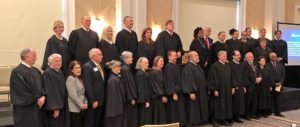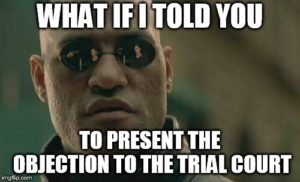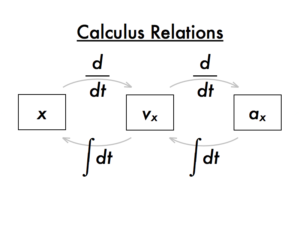 The appellant in In re Knies challenged an order about an award of attorneys’ fees in connection with a discovery matter, entered four months after the trial court’s plenary power expired. The Fifth Court found that it had no jurisdiction over this void order, reasoning: “Judicial action taken after the expiration of the court’s jurisdiction is a nullity, and any orders signed outside the court’s plenary jurisdiction are void. We have no jurisdiction to consider the merits of an appeal from a void order.” (citation omitted). (Of course, in reaching that conclusion, the Court necessarily held that the order was void, which is basically the relief appellant was requesting by a different path.) No. 06-18-00919-CV (Oct. 30, 2018) (mem. op).
The appellant in In re Knies challenged an order about an award of attorneys’ fees in connection with a discovery matter, entered four months after the trial court’s plenary power expired. The Fifth Court found that it had no jurisdiction over this void order, reasoning: “Judicial action taken after the expiration of the court’s jurisdiction is a nullity, and any orders signed outside the court’s plenary jurisdiction are void. We have no jurisdiction to consider the merits of an appeal from a void order.” (citation omitted). (Of course, in reaching that conclusion, the Court necessarily held that the order was void, which is basically the relief appellant was requesting by a different path.) No. 06-18-00919-CV (Oct. 30, 2018) (mem. op).
Monthly Archives: October 2018
 The intersection between the presuit deposition procedure of Tex. R. Civ. P. 202 and a city’s sovereign immunity resulted in a victory for Rule 202 in City of Dallas v. Dallas Companion Animal Project: “DCAP pleaded sufficient facts to support a claim that employees of the City acted in their individual capacities in initiating, and disclosing information about, a criminal investigation into DCAP’s activities . . . . Accordingly, the fact the City
The intersection between the presuit deposition procedure of Tex. R. Civ. P. 202 and a city’s sovereign immunity resulted in a victory for Rule 202 in City of Dallas v. Dallas Companion Animal Project: “DCAP pleaded sufficient facts to support a claim that employees of the City acted in their individual capacities in initiating, and disclosing information about, a criminal investigation into DCAP’s activities . . . . Accordingly, the fact the City  may be immune from DCAP’s claims or any City employee who acted in the course and scope of his employment may be entitled to a dismissal of DCAP’s claims does not deprive the trial court of jurisdiction over DCAP’s rule 202 petition.” No. 05-18-00453-CV (Oct. 26, 2018). (Procedurally, the opinion reminds in footnote 8 that the best practice is to actually offer the verified Rule 202 petition and any supporting materials into evidence.)
may be immune from DCAP’s claims or any City employee who acted in the course and scope of his employment may be entitled to a dismissal of DCAP’s claims does not deprive the trial court of jurisdiction over DCAP’s rule 202 petition.” No. 05-18-00453-CV (Oct. 26, 2018). (Procedurally, the opinion reminds in footnote 8 that the best practice is to actually offer the verified Rule 202 petition and any supporting materials into evidence.)
 The appellant in CBRE, Inc. v. Turner sought to avoid arbitration based on a long line of Texas authority about “illusory” arbitration clauses, see, e.g., In re: Halliburton Co., 80 S.W.3d 566 (Tex. 2002). This clause, however, “unlike the employment agreements in other cases . . . did not give CBRE the right to modify the employment agreement unilaterally or the right to terminate the arbitration policy without terminating the employment agreement,” and thus was not illusory. No. 05-18-00404-CV (Oct. 22, 2018).
The appellant in CBRE, Inc. v. Turner sought to avoid arbitration based on a long line of Texas authority about “illusory” arbitration clauses, see, e.g., In re: Halliburton Co., 80 S.W.3d 566 (Tex. 2002). This clause, however, “unlike the employment agreements in other cases . . . did not give CBRE the right to modify the employment agreement unilaterally or the right to terminate the arbitration policy without terminating the employment agreement,” and thus was not illusory. No. 05-18-00404-CV (Oct. 22, 2018).
 The Fifth Court celebrated its Quasquicentennial Anniversary – yes, that’s a thing, it means “125th” – at Belo yesterday. To the right is a remarkable picture of current and former Justices, as well as Chief Justice Hecht. The materials included this informative history of the court running back to its establishment in 1893.
The Fifth Court celebrated its Quasquicentennial Anniversary – yes, that’s a thing, it means “125th” – at Belo yesterday. To the right is a remarkable picture of current and former Justices, as well as Chief Justice Hecht. The materials included this informative history of the court running back to its establishment in 1893.
 A motion for new trial about a default judgment based on the three Craddock factors often spends most of its time on the first (mistake or accident) and second (meritorious defense) factors. But Craddock has three factors, and the third factor is both straightforward to satisfy and problematic if overlooked:
A motion for new trial about a default judgment based on the three Craddock factors often spends most of its time on the first (mistake or accident) and second (meritorious defense) factors. But Craddock has three factors, and the third factor is both straightforward to satisfy and problematic if overlooked:
“To meet the third element of Craddock, all Thompson had to do was allege in her motion for new trial that granting a new trial would not injure appellee. She could have met this requirement by offering in the motion for new trial to pay appellee’s attorney’s fees and expenses for obtaining the judgment. Had she done so, the burden of showing harm would have shifted to appellee to show injury. In this case, neither the motion to reinstate nor the motion for new trial asserted that granting a new trial would not injure appellee. Nor did the motions offer to pay appellee’s attorney’s fees and expenses for obtaining the judgment.”
Thompson v. Dallas City Attorney’s Office, No. 05-17-00847-CV (Oct. 18, 2018) (mem. op.)
 Today’s Appellate CLE presentation about advocacy tips and key SCOTX cases had more sitting Justices in attendance than most appellate courts have members; it was presented by Justices Lang, Lang, Francis, Lang-Miers, Evans, Stoddart, and Boatright, with Justices Myers, Schenck, and Whitehill in attendance (as well as retired Justice Morris, and numerous staff attorneys from the Fifth Court). Here is a copy of the handout; among many items discussed:
Today’s Appellate CLE presentation about advocacy tips and key SCOTX cases had more sitting Justices in attendance than most appellate courts have members; it was presented by Justices Lang, Lang, Francis, Lang-Miers, Evans, Stoddart, and Boatright, with Justices Myers, Schenck, and Whitehill in attendance (as well as retired Justice Morris, and numerous staff attorneys from the Fifth Court). Here is a copy of the handout; among many items discussed:
- Citation – Who knew? The new Green Book for Texas case citations has eliminated the need to say “Tex. Civ. App.” for older intermediate-court opinions, standardizing all such citations with “Tex. App.”
- Don’t Get Seimed. Seim v. Allstate Texas Lloyds, 551 S.W.3d 161 (Tex. 2018), in
 clarifying the distinction between objections of “form” and those of “substance” in summary judgment practice, may have affected other lines of authority about specific types of common objections – beyond those expressly discussed in the opinion.
clarifying the distinction between objections of “form” and those of “substance” in summary judgment practice, may have affected other lines of authority about specific types of common objections – beyond those expressly discussed in the opinion.
The relator in In re Tunad Enterprises challenged a sanction; the Fifth Court found presentment problems with two key arguments:
In re Tunad Enterprises challenged a sanction; the Fifth Court found presentment problems with two key arguments:
- as to whether the required pretrial payment will substantially harm the relator and have a preclusive effect on his ability to continue to prosecute the case – a colorable argument, in the abstract – “Relator did not make this argument in the trial court and presented no evidence of the alleged harm”; and
- as to an issue with the trial court’s subject matter jurisdiction that was pending in a Rule 91 motion, “it is premature to seek a writ of mandamus without the trial court first ruling on the very matters upon which relief is sought.”
No. 05-18-01157-CV (Oct. 15, 2018) (mem. op.)
 A common claim in mortgage-foreclosure litigation is that, during negotiations between the servicer/lender and the borrower, the lender abandons the acceleration of the underlying loan obligation. The issue is often litigated because of its effect on limitations – abandonment means that the foreclosure process can begin anew; otherwise, the limitations clock runs from the initial acceleration. The 2008 financial crisis produced a lengthy series of Fifth Circuit cases on the issue, as well as a large body of state case law, the substantial majority of which found abandonment and thus no limitations bar to foreclosure. Pitts v. Bank of New York is to the contrary, observing:
A common claim in mortgage-foreclosure litigation is that, during negotiations between the servicer/lender and the borrower, the lender abandons the acceleration of the underlying loan obligation. The issue is often litigated because of its effect on limitations – abandonment means that the foreclosure process can begin anew; otherwise, the limitations clock runs from the initial acceleration. The 2008 financial crisis produced a lengthy series of Fifth Circuit cases on the issue, as well as a large body of state case law, the substantial majority of which found abandonment and thus no limitations bar to foreclosure. Pitts v. Bank of New York is to the contrary, observing:
“But the statements and notices contained no language similar to that in [Boren v. U.S. Nat’l Bank, 807 F.3d 99 (5th Cir. 2015)], and the cases following Boren stating that if Castle Mortgage did not pay the amount demanded, then the loan would be accelerated. Language stating that the loan would be accelerated is inconsistent with an earlier notice of acceleration and clearly establishes the noteholder’s abandonment of the earlier acceleration because, if the noteholder intended to rely on the earlier notice of acceleration, it would not state that acceleration could occur in the future. Without that language, the monthly statements and delinquency notices in this case lack one of the two bases for the Fifth Circuit’s conclusion in Boren that the notices to the borrower conclusively established the noteholder’s abandonment of an earlier acceleration.”
No. 05-17-00859-CV (Oct. 12, 2018).
 Dallas appellate practitioners – or anyone interested in the Fifth Court – should put these great events on their calendar for this month:
Dallas appellate practitioners – or anyone interested in the Fifth Court – should put these great events on their calendar for this month:
- Awesome CLE: “Panel Discussion with the Justices: Recent Cases Every Practitioner Should Know About and Tips for Practicing Before the Fifth District Court of Appeals at Dallas,” featuring Justices Lang, Francis, Lang-Miers, Evans, Stoddart, and Boatright. October 18, 2018, noon, at Belo.
- 125th Anniversary: Celebration of the 125th Anniversary of the Fifth Court, October 22, 2018, 3:00-5:30, at Belo. Please R.S.V.P. to Angelica Aguilar, angelica.aguilar@5th.txcourts.gov. (1893 was a busy year for court-creation; not only did the Legislature create the Fourth and Fifth Courts, but Congress created the modern version of the U.S. Court of Appeals for the D.C. Circuit).
 In Kiewit Offshore v. Dresser-Rand, the Fifth Circuit affirmed a summary judgment for the plaintiff in a large construction matter; as the final point addressed, the Court observed: “Dresser-Rand contends, for the first time on appeal, that Kiewit submitted insufficient, conclusory summaries of the work reflected in Invoices DR-04b, 05, and 06, preventing the district court from verifying the total amount of damages Kiewit claimed. Dresser-Rand failed to raise this argument below, and we therefore decline to consider it here.” The Court also noted that “it was undisputed that the invoices accurately reflected actual costs incurred . . . for work performed and accepted . . . .” It is a fair question whether the same result would obtain under Texas state practice, which among other matters distinguishes between “substantive” and “form” objections to summary judgment affidavits – “form” issues requiring objection, but not substantive ones. See Seim v. Allstate Texas Lloyds, No. 17-0488, 2018 WL 3189568, at *3 (Tex. June 29, 2018) (per curiam).
In Kiewit Offshore v. Dresser-Rand, the Fifth Circuit affirmed a summary judgment for the plaintiff in a large construction matter; as the final point addressed, the Court observed: “Dresser-Rand contends, for the first time on appeal, that Kiewit submitted insufficient, conclusory summaries of the work reflected in Invoices DR-04b, 05, and 06, preventing the district court from verifying the total amount of damages Kiewit claimed. Dresser-Rand failed to raise this argument below, and we therefore decline to consider it here.” The Court also noted that “it was undisputed that the invoices accurately reflected actual costs incurred . . . for work performed and accepted . . . .” It is a fair question whether the same result would obtain under Texas state practice, which among other matters distinguishes between “substantive” and “form” objections to summary judgment affidavits – “form” issues requiring objection, but not substantive ones. See Seim v. Allstate Texas Lloyds, No. 17-0488, 2018 WL 3189568, at *3 (Tex. June 29, 2018) (per curiam).
After a Fifth Court panel reversed a plaintiff’s judgment in a premises liability case, the plaintiff’s counsel filed a motion to recuse based on campaign contributions received by two of the Justices on the panel. That motion led to an uncommon en banc opinion by the Fifth Court, which found that the motion was untimely (as it was made after receiving an adverse ruling) and lacked merit:
“Whether favored by judges or not, Texas selects its judges by popular election and requires that they finance this process. It has done so for more than a century. Recognizing this reality, Texas courts have spoken definitively and clearly with respect to the effect of campaign contributions on recusal. The mere receipt of campaign funds, in and of itself, without an indication of communication or coordination of the handling of a case, is not a basis for recusal.”
The Court then referred the plaintiff’s counsel to the State Bar for potential disciplinary action, noting that had he “ended his motion with the complaint regarding the mere receipt of campaign contributions by two justices on the panel deciding the appeal, we would deny the motion without further comment,” but instead “he has taken his disappointment with the outcome of this case to an inappropriate level by attacking the integrity of this Court . . . .” AVPM Corp. v. Childers, No. 05-17-00372-CV (revised Oct. 9, 2018) (en banc).
 Relators superseded a judgment and sought mandamus relief against certain trial court proceedings. The Fifth Court dismissed the petition, observing: “Here, relators did not ask the trial court to dissolve the garnishments or stay the hearing on the motion for sanctions and application for turnover order. The trial court’s ‘Writ of Supersedeas’ provided relators with all of the relief they requested below.” In re: Raley, No. 05-18-01119-CV (Oct. 2, 2018) (mem. op.)
Relators superseded a judgment and sought mandamus relief against certain trial court proceedings. The Fifth Court dismissed the petition, observing: “Here, relators did not ask the trial court to dissolve the garnishments or stay the hearing on the motion for sanctions and application for turnover order. The trial court’s ‘Writ of Supersedeas’ provided relators with all of the relief they requested below.” In re: Raley, No. 05-18-01119-CV (Oct. 2, 2018) (mem. op.)
 Mark your calendars – the 125th Anniversary (!!!) of the Fifth Court will be celebrated soon –
Mark your calendars – the 125th Anniversary (!!!) of the Fifth Court will be celebrated soon –
- Monday, October 22, 2018
- 3:00 p.m. – 5:30 p.m.
- The Pavilion Ballroom at the Belo Mansion, downtown Dallas
Please R.S.V.P. to Angelica Aguilar by October 10th, angelica.aguilar@5th.txcourts.gov
 The party opposing arbitration in Camp v. Potts pointed to a year-long delay in moving to compel arbitration, during which the underlying matter was set for trial and required travel and expense to be available during that setting. Unfortunately, as to other parts of the framework in Perry Homes v. Cull, 258 S.W.3d 580 (Tex. 2008), “[t]he record . . . contains no evidence the trial preparation would not be useful in arbitrating their claims as well,” and the parties “have not argued, and we see no evidence in the record, that the delay caused any harm caused to their legal position.” Accordingly, the Fifth Court reversed the denial of the motion to compel arbitration. No. 05-18-00149-CV (Oct. 1, 2018) (mem. op.)
The party opposing arbitration in Camp v. Potts pointed to a year-long delay in moving to compel arbitration, during which the underlying matter was set for trial and required travel and expense to be available during that setting. Unfortunately, as to other parts of the framework in Perry Homes v. Cull, 258 S.W.3d 580 (Tex. 2008), “[t]he record . . . contains no evidence the trial preparation would not be useful in arbitrating their claims as well,” and the parties “have not argued, and we see no evidence in the record, that the delay caused any harm caused to their legal position.” Accordingly, the Fifth Court reversed the denial of the motion to compel arbitration. No. 05-18-00149-CV (Oct. 1, 2018) (mem. op.)
 The mandamus petition in In re Lafredo, a divorce proceeding involving a same-sex marriage, addressed whether Obergefell v. Hodges should apply retroactively. As to the requirement of a clear abuse of discretion, in addition to noting that “the existence of an informal or common law marriage is a question of fact to be resolved by the fact finder,” the Fifth Court noted: “The legal question of whether Obergefell is retroactive has not been determined by the Supreme Court of Texas or by the U.S. Supreme Court. The trial court, therefore, did not fail to correctly analyze or apply the law or reach an arbitrary and unreasonable decision when it determined that relator had not established as a matter of law that no legal marriage existed . . . .” No. 05-18-01034-CV (Sept. 24, 2018) (mem. op.)
The mandamus petition in In re Lafredo, a divorce proceeding involving a same-sex marriage, addressed whether Obergefell v. Hodges should apply retroactively. As to the requirement of a clear abuse of discretion, in addition to noting that “the existence of an informal or common law marriage is a question of fact to be resolved by the fact finder,” the Fifth Court noted: “The legal question of whether Obergefell is retroactive has not been determined by the Supreme Court of Texas or by the U.S. Supreme Court. The trial court, therefore, did not fail to correctly analyze or apply the law or reach an arbitrary and unreasonable decision when it determined that relator had not established as a matter of law that no legal marriage existed . . . .” No. 05-18-01034-CV (Sept. 24, 2018) (mem. op.)